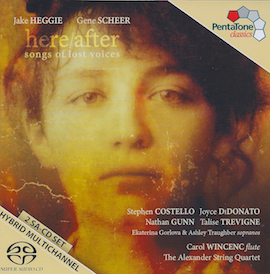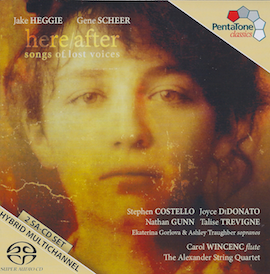
To savor the artistic mastery of the composer/librettist team of Jake Heggie and Gene Scheer at their imaginative best, turn to their new new Pentatone SACD, here/after. Only the DVD of San Francisco Opera’s premiere of their opera, Moby Dick, rivals it in quality.
The two-disc set, which offers optional multichannel playback, includes five of the duo’s recent song cycles, four of which address specific artists or artworks. By pairing them with two works for flute and piano that are based on material in Heggie and Scheer’s songs and operas (including Moby Dick), here/after presents one beautiful, provocative, moving, and occasionally hilarious exploration after the other.
Heggie has always been blessed with a rich assortment of friends and colleagues upon whom he can call for recording and performance. Here, that artistic treasure trove includes many of the pieces’ originators: mezzo-soprano Joyce DiDonato and the Alexander String Quartet, for whom Camille Claudel: Into the Fire was composed, and who premiered it in Herbst Theatre on Feb. 4, 2012; baritone Nathan Gunn, who sang the premiere of A Question of Light at the 2011 Dallas Opera Gala; and veteran flutist Carol Wincenc, to whom Fury of Light (2009) is dedicated. In addition, tenor Stephen Costello and soprano Talise Travigne, two stars of Moby Dick, also perform, as do young sopranos Ekaterina Gorlova and Ashley Traughber. Other stellar musicians who join pianist Heggie on two of the selections include San Francisco Opera violinist Dawn Harms, cellist Emil Miland, clarinetist José González Granero, and flutist Dawn Walker, as well as San Francisco Conservatory of Music guitarist Marc Teicholz.
Heggie certainly knows the strengths of his artists. The beautiful cycle about sculptress Camille Claudel, recorded six months after its premiere, reveals how more nuanced and deeply felt DiDonato’s interpretation has grown with the passage of time. Its third movement, “Shakuntala,” manages to showcase her rare coloratura facility and perfect trills without once sounding showy. The pathos of “La Petite Châtelaine” is profoundly moving, thanks in part to the tremolo strings of the Alexanders. All forces excel in “The Gossips,” where the quartet’s churning strings speak volumes.
Trevigne, who delighted and moved as Pip in Moby Dick, is perfect for the very different cycle, Rise and Fall (2007). Describing four episodes in a woman’s life through art objects at New York’s Metropolitan Museum of Art, Trevigne brings radiant tone, elegance, and a sense of Zen-like contemplation to “Water Stone.” After singing exquisitely three songs dedicated to art works with a decidedly spiritual bent, she switches gears to have some fun with the bluesy aspects of the more than slightly wicked final song, “The Shaman.”
Costello’s rendition of the four songs in Friendly Persuasions: Homage to Poulenc combines equally beautiful and insightful singing with, in the song that visits Poulenc’s relationship with “Wanda Landowska,” gay hilarity. Wincenc is ever the master in her definitive performances, and the young sopranos are a delight. The only disappointment is the handsomely voiced Gunn, whose melodramatic contributions to Pieces of 9/11: Memories of Houston (2011) are insufferably overwrought. Once you get past those, it’s likely you’ll hit “repeat,” because repeated listening is what you’ll most likely do when savoring the depth and mystery of these wonderful works.

